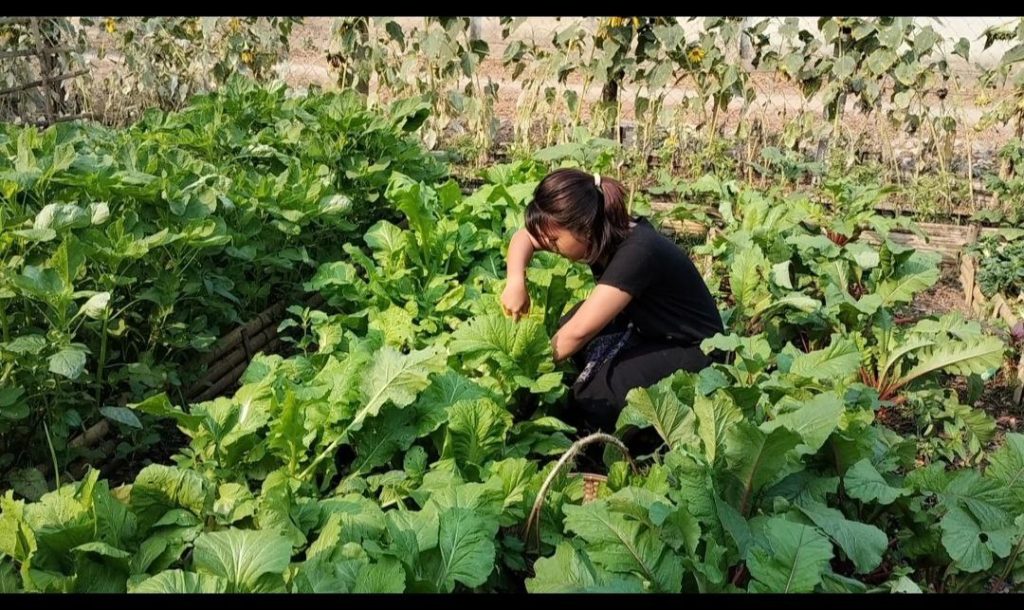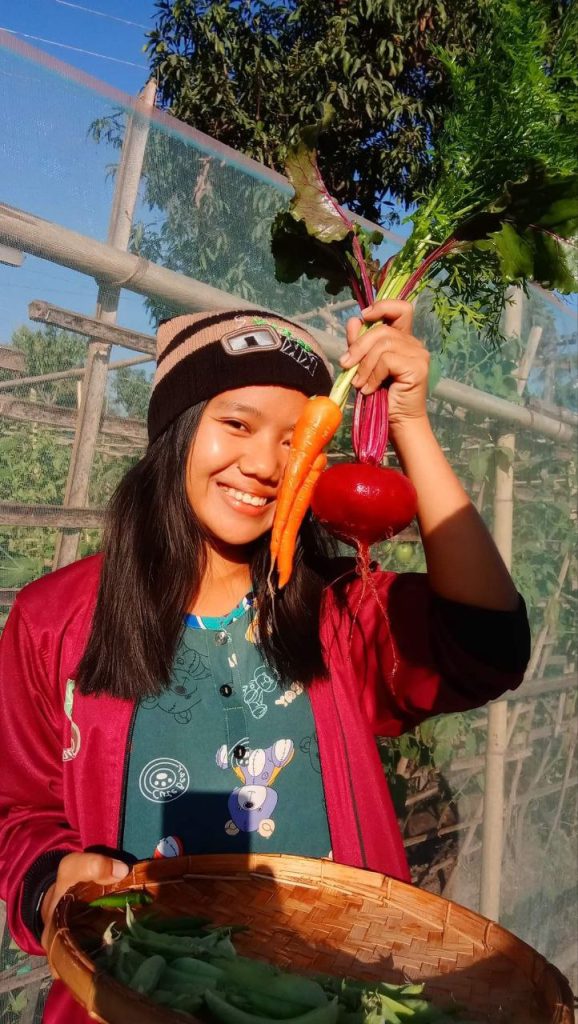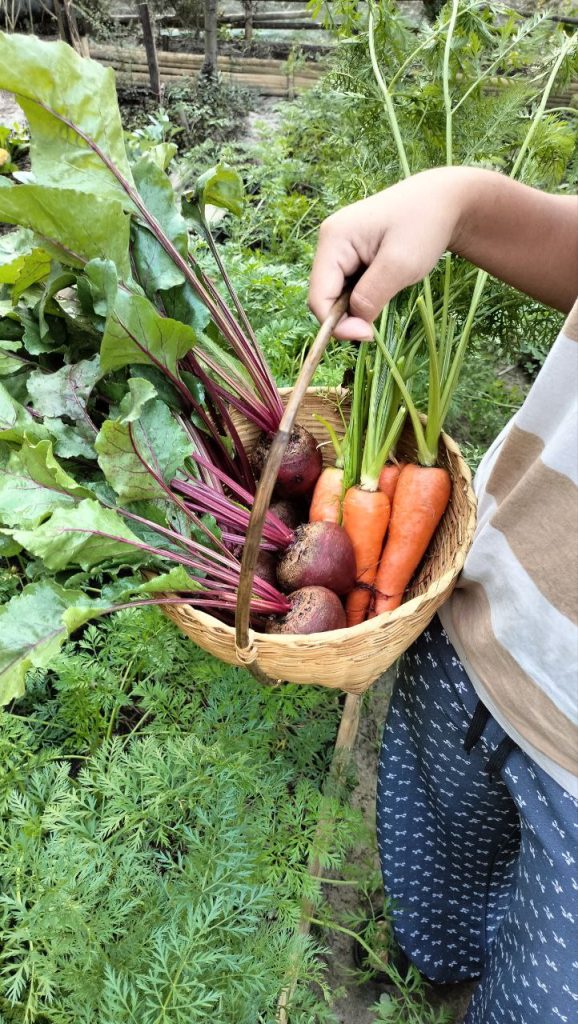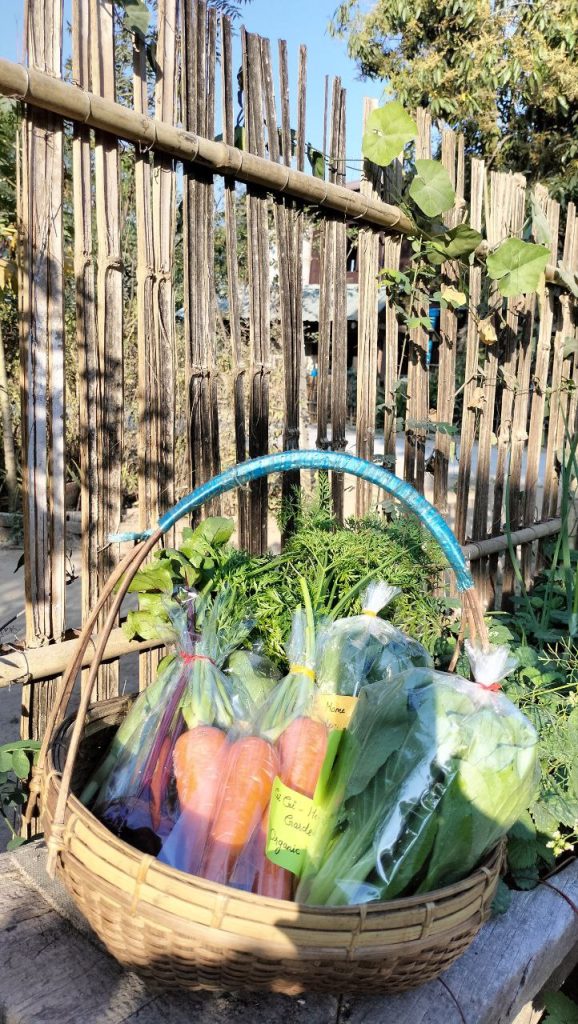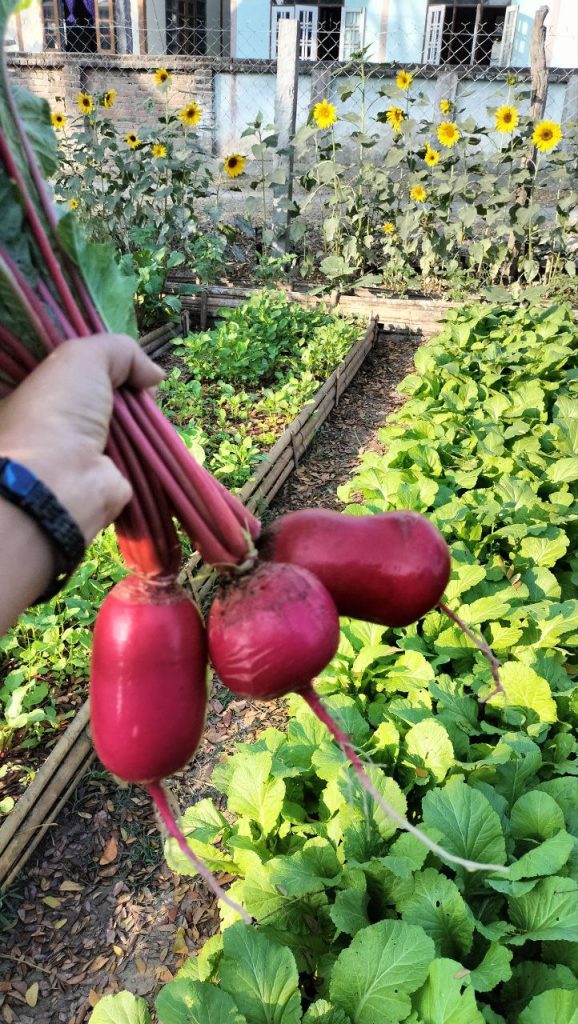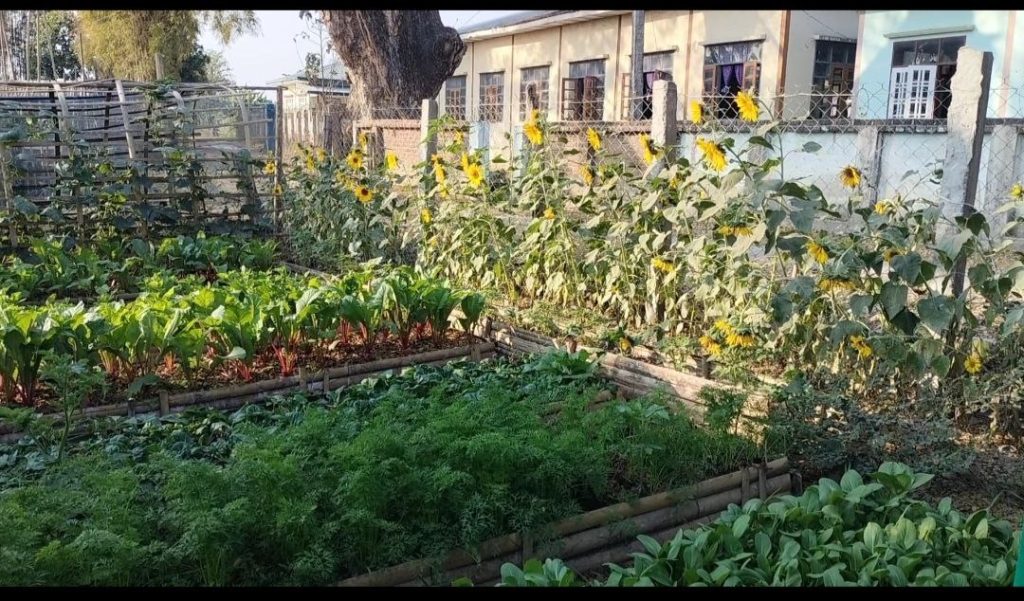Kae Khaing
“There may be times food cannot be bought and nothing to eat.
are moments when I can’t always buy food. So, when I realized that I could grow my own food, I decided to grow as many plants as possible,” shared Ma Theingi Hlaing, who loves growing a crop in the garden at home.
Gigi, also known as Ma Theingi Hlaing, is a 20-year-old young woman who lives in Yedashae Township, Bago Division. She is doing the gardening with the name of “Gigi – Home Garden.”
In her garden, she grows over 50 types of plants, including vines, vegetables such as eggplants, fruits, and some medicinal plants and flowers.
Ma Theingi Hlaing, a passionate gardener, took part in an agricultural contest called the “Agri-Women Entrepreneurship Home Nutrition Garden Award” organized by SST Tourism and Social Enterprise and the organic organization MOGPA Team in June.
The competition aimed to inspire a love for nature, prioritize family health, and recognize women across Myanmar who cultivate crops in their home yards. In this competition, Ma Theingi Hlaing won the prize among those who were selected as Agri-women.
Top of Form
The awards were given to the five women who met specific criteria: individuals capable of gardening at home to support their family’s daily consumption; using non-toxic fertilizer for growth; effectively reusing kitchen waste for better plant growth and recycling nutrients; gardening without relying on chemicals; and possessing a deep understanding of the nutritional value of crops while ensuring the well-being of their families.
“I see the results of the recognition of the values and the sustainability. I feel a greater sense of satisfaction and renewed strength in promoting positive habits for progress,” expressed Ma Theingi Hlaing, recipient of the Agri-women Award.
She decided to contest in the competition for the award because her trainer invited her. Ma Theingi Hlaing, who enjoys home gardening, documented the gardening process with step-by-step instructions and pictures.
She did not make any special preparations for the competition; she just simply submitted videos.
Anyhow, Ma Theingi Hlaing mentioned that she got chosen because her information fit with the competition’s criteria.
“The history of Home Garden”
Ma Theingi Hlaing, a University of Agriculture graduate, grew up with her parents who are farmers, so she is no stranger to agriculture. However, the lack of awareness among farmers and persistent challenges in technology and the quality of seeds and fertilizers were keys for her to pursue of agricultural studies.
She made the fence with small recycled bamboo and damaged bricks at a vacant lot 15 feet wide in her house compound and planted small lettuce, mustard, purple eggplants, and radishes.
After successful admission to the university, she pursued studies at the University of Yezin Agriculture to pursue her aspirations. In 2017, during the third year of her university education, two months of school breaks, she started a Home Garden Project because she wanted her family to have safe and fresh vegetables.
Getting natural compost at the beginning of planting was a challenge. Since she knew the harmful effects of chemicals on health, she did not want to use them, and it was not always a success to use natural fertilizers.
To address this, she utilized natural cow dung for planting, aiming to strengthen the plants without relying on any chemical fertilizers. Moreover, she had to purchase and plant new seeds every season, opting for foreign hybrid seeds exclusively.
“Overcome the covid-19 pandemic time”
Just as she was implementing home gardening, the COVID-19 pandemic happened. During the pandemic, with people avoiding going out, families in her neighboring areas experienced food shortages.
She sought ways to cultivate crops rich in nutrients. As the demand for safely grown vegetables, Ma Theingi Hlaing, along with her family, expanded their planting of diverse crops in every available lot around their home.
Even with the pandemic outbreak, the family remained vigilant in avoiding COVID-19 infection and continued to stay healthy. By engaging in home gardening, they not only stayed healthy but also spent more quality time together, fostering mindfulness and a closer bond among family members.
They became closer with their neighbors and inspired other women in households to take an interest in home gardening, and this has proven to be a valuable outcome, she said.
“ Learning from her own research ”
In 2019, during her internship in Kayah State, a small village in Loikaw, as part of her final year in agriculture, Ma Theingi Hlaing conducted a group research project focused on identifying vegetables and fruits suitable for the local climate. Drawing on the research experiences involving experiments with diverse vegetables and fruits, she incorporated natural fertilizers into her home garden.
In her modest garden, she tested natural soil fertilizers for vegetable crops and also fruits. The tests were a success and, in the end, all her plants thrived
Moreover, priority was given to growing plants that families commonly consume. This approach has expanded the variety of crops and plant species, including lilies which are commonly used for the merit to the Buddha, resulting in a collection of over 50 varieties.
Due to the tropical climate in Ma Theingi Hlaing’s location, she cultivates not only heat-tolerant and rain-resistant plants but also crops that typically thrive in colder regions in her Home Garden.
Seeing the gradual growth of the small plants she planted from the time the seeds were sown brought joy to her.
Ma Theingi Hlaing expressed, “It’s gratifying for the family to enjoy safe and fresh produce.”
It was beneficial for families to consume home-grown vegetables safely and freshly. During the winter season, when various crops could be cultivated, there was no longer a need to purchase any food for the kitchen, except for meat and fish.
“Sharing to neighbors”
The crops harvested from the garden are more than enough for the family and therefore, neighbors, friends, and at least 20 households always receive a share. She mentioned that some vegetables and fruits are also sold at a low price.
“Neighbors’ homes, relatives’ residences, and people who show interest and visit me always receive these vegetables and fruits as gifts. It has become a tradition in my family to share these as gifts, helping to uphold the tradition of giving or sharing things in the countryside,” she explained.
Indoor cultivation lowers financial expenses for the family, and consuming chemical-free vegetables and fruits is also beneficial for health.
Consequently, she recommends and encourages other women to begin planting in any place with locally available seeds.
“It’s really important to eat safe crops. And when you eat them happily, they taste even better,” said Ma Theingi Hlaing.
Due to the country’s poor economic situation, and people think it is better to work in cities, many young folks are not interested in traditional farming anymore.
“When you spend money on hospitals because of unhealthy food, it’s not just about money – it’s also about suffering and pain. That’s why all women need to care about their health by eating and growing their chemical-free food every day,” she explained.
To keep the environment safe and to have enough food, there should be more young farmers. She thinks that having young people and women as farmers plays a key role in solving the problem of food shortage.
“Everyone who eats should also help grow food. The idea that every farmer should have enough food makes her realize the issue of food shortage that we are facing today,” she said.
“Home Garden as an Ex-habitation “
Ma Theingi Hlaing expressed her goal to expand her small home garden into not just personal and family consuming but also transform it into a demonstration farm.
She is acquiring the skills to plant and produce using homemade natural compost and fertilizers, beginning with soil preparation and input incorporation, aiming to demonstrate to those interested how to operate with Zero Waste in practice, including recycling waste leaves and compost from the farm.
Furthermore, to make people understand the importance of preserving local plant species, she has kept aside plants for breeding. She mentioned that the gathered seeds will be shared as part of an ongoing process to systematically promote breeding.
She said that she plans to persist with the Home Garden, aspiring for the family to consume non-toxic vegetables.
Ultimately, she hopes that every household will have the competence to grow and produce their food safely.
Ma Theingi Hlaing continued, “Apart from helping our minds and bodies to stay healthy, having a garden allows us to connect with our community. It also helps us the importance of water and soil, which we sometimes might forget to consider. We have to look after the health of the water and soil.”
Burmese Version – အိမ်တွင်း ဥယျာဉ်မှူး (သို့မဟုတ်) Gi Gi – Home Garden ပဲ့ကိုင်ရှင်



